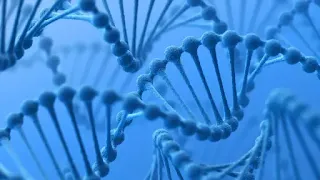Creationist mode: 
Creationism’s favourite divine malevolence could have given humans the same protection from cancer that it gave to elephants, but it chose not to.
Instead, it gave us a mutated version of a gene that makes us more likely to develop life-threatening cancers when the replication mechanism it designed for our cells, goes wrong and the faulty DNA doesn't get repaired. This replication mechanism, where the entire genome is replicated even though most cells will use only a small fraction of it, is necessary because the designer used the same method for us multicellular animals that it created for single-celled organisms, so being massively wasteful and increasing the danger of something going wrong, of course, but that's a slightly different issue.
I have more to say on this phenomenon in my popular, illustrated book, The Malevolent Designer: Why Nature's God is not Good
What scientists have recently discovered is that the gene, BRCA2, which plays a key role in repairing the DNA when it isn't replicated properly, has been modified in humans to make it less effective at doing what it was designed to do in other mammals, including chimpanzees. This repair mechanism was already far less efficient than that in elephants which get multiple copies of these repairing genes, so, although they have very many more cells than us and so very many more cell replications as they grow, they very rarely get cancers.
Even in our closest relative, the other great apes, cancers are relatively rare. Between 1901 and 1932, of the 971 non-human primates that died in Philadelphia Zoo, only 8 were found to have tumours on autopsy. so there is no doubt that humans, supposedly the favourite creation of creationism's favourite creator, are designed to get cancers more than most mammals and the decision to design us that way was a choice.
Creationist must believe, because they are obliged to, that this change in the BRCA2 gene can't have been accidental because nothing happens in nature without the intention and involvement of their magic creator, so we can only assume it wants us to get cancer.
Creationist mode: 
Now to the science, which, unlike creationism and the childish notion of intelligent design, makes sense of the facts:
Christine Iacobuzio-Donahue at Memorial Sloan Kettering Cancer Center in New York and her colleagues compared hundreds of genes from human and non-human primates and found that we evolved a slightly different version of BRCA2 when we split from chimpanzees. The change was only slight, in fact it was the smallest change possible - a single nucleotide difference, but this change makes BRCA2 about 20% worse at repairing DNA than that in the other apes. We already knew that other changes in BRCA2 make some people susceptible to cancers but this is the first time this single-point mutation has been shown to be common to all humans.
The question then is why what would seem to be an obviously deleterious mutation was not quickly eliminated by natural selection and the reason for this may be found in earlier work which showed that women with defective BRCA2 are slightly more likely to become pregnant. Since cancers tend to develop in later life, when the woman will already have had several children, natural selection selected for this mutation because it gave more offspring, not strongly affected by the increased death rate from cancer. Evolution by natural selection is an unemotional process where a balance between a strongly advantageous trait is balanced against a weakly deleterious one, regardless of any resulting suffering to the individual carriers of it.
The team's findings were published, open access, a few days ago in Cell Reports:
Highlights
- Hundreds of human-specific substitutions of cancer genes emerge during evolution
- A substitution of BRCA2 codon 2662 is located at the most conserved domain
- This substitution decreases the interactions of BRCA2 with DSS1
- The substitution triggers a 20% reduction in recombinational DNA repair ability
Summary
We performed a comparative analysis of human and 12 non-human primates to identify sequence variations in known cancer genes. We identified 395 human-specific fixed non-silent substitutions that emerged during evolution of human. Using bioinformatics analyses for functional consequences, we identified a number of substitutions that are predicted to alter protein function; one of these mutations is located at the most evolutionarily conserved domain of human BRCA2.
Huang, Jinlong; Zhong, Yi; Makohon-Moore, Alvin P.; White, Travis; Jasin, Maria; Norell, Mark A.; Wheeler, Ward C.
Evidence for reduced BRCA2 functional activity in Homo sapiens after divergence from the chimpanzee-human last common ancestor
Cell Reports Volume 39, Issue 5, 110771; DOI: 10.1016/j.celrep.2022.110771
Copyright: © 2022 The authors. Published by Elsevier Inc
Open access
Reprinted under a Creative Commons Attribution-NonCommercial-NoDerivatives 4.0 International (CC BY-NC-ND 4.0)
That leaves creationist with either accepting that phenomena such as this are the result of a mindless, unintelligent, undirected utilitarian process which produces a sub-optimal but predictable outcome, or as with the SARS-CoV-2 virus and its many variants, continuing to present their favourite god as a divine malevolence who deliberately increases the suffering in the world, this time by creating cancers, and who appears to have given humans a greater susceptibility to cancer as a matter of choice.
Of course, the wise ones, if there are any, will realise that they can't cite biblical mythology as the reason for this because that would give away the fact that ID creationism is simple fundamentalist Bible literalism dressed up in a lab coat and not a genuine alternative science, like the Deception Institute and its hirelings have been working assiduously to fool people into believing for several decades now.




No comments :
Post a Comment
Obscene, threatening or obnoxious messages, preaching, abuse and spam will be removed, as will anything by known Internet trolls and stalkers, by known sock-puppet accounts and anything not connected with the post,
A claim made without evidence can be dismissed without evidence. Remember: your opinion is not an established fact unless corroborated.